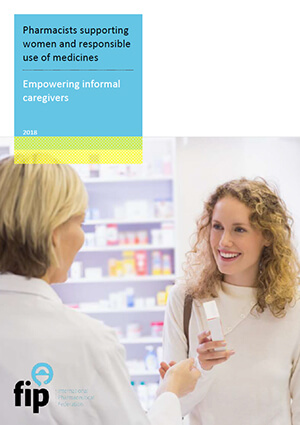An FIP report examines how pharmacists can support women caregivers and encourage appropriate medication use.
By Emily Jacobs
Many women around the world are caregivers at some point in their lives, often becoming the unofficial healthcare managers in their households. These responsibilities frequently involve the use of medicines, whether that means providing medication to a sick child, helping an aging parent take medicine correctly or picking up a spouse’s prescription at the pharmacy. When female caregivers are better informed about the appropriate use of medicines, this can positively influence the health of their households and wider communities.
This idea provides the basis of “Pharmacists Supporting Women and Responsible Use of Medicines,” a recently released report from the International Pharmaceutical Federation (FIP), an organization that represents pharmacy and pharmaceutical sciences across the globe. Dr. Carmen Pena, FIP’s first female president, initiated the work during her presidency from 2014-2018. In the report, FIP addresses how pharmacists can promote gender equality and encourage appropriate medication use through the support of unpaid women caregivers. Pharmacists can positively impact these women and their communities by promoting policy changes, participating in public health programs and demonstrating compassionate care.
Women as Caregivers and Household Health Managers
Women disproportionately become the unofficial health managers in their homes, taking on the greatest burdens of unpaid care. The FIP report found that, in the United States, women spend 50 percent more time in caregiving roles than men. Data from six African countries showed that 81 percent of informal caregivers are women. The report also cites a 2011 survey that found that Costa Rican women spend about 70 hours per week working, of which an estimated 15 hours includes informal care.
Despite being considered a “lesser” role in many societies, unpaid caregiving has an enormous influence on homes and communities. Women are usually the ones to encourage family members to see a healthcare professional and to make sure that they take medicines as instructed. Women are most often the ones to address their children’s health needs or make medical decisions for sick or elderly family members.
Because women most often care for family health and well-being, they are usually the ones to oversee medication use in the household. Women often search for information about their children’s, spouse’s or parent’s medications and how to use them correctly. They also want knowledge and support for the proper use of medicine during pregnancy, breastfeeding and menopause.
“Women are, as we can see from data from the report, most often the person in the household that assumes the role of informal caregiver,” said Ema Paulino, FIP professional secretary and board member, and chair of the Working Group on Women and the Responsible Use of Medicines. “Therefore, women visit pharmacies frequently, due to their proximity and accessibility, to seek information and health solutions for problems for themselves and also for other family members. The pharmacist, having this opportunity, should seek to proactively empower women in this role.”
Educating and Empowering Women
The correct use of medicines in society can reduce mortality, improve quality of life and decrease overall healthcare costs. A 2012 study by the IMS Institute for Healthcare Informatics estimated that the appropriate use of medicines could save $500 billion worldwide. Despite these benefits, however, the World Health Organization reports that only about half of patients in developed countries take their medicines correctly. That rate may be even lower in undeveloped countries.
As trusted, public-facing health providers, pharmacists are in a key position to provide female caregivers with appropriate education on the use of medicines. Pharmacists can offer and simplify health information, alter the flavor of medicine for children or adjust medication dosages during pregnancy. Pharmacists also can make other health recommendations, such as encouraging breastfeeding, and teach women to recognize disease symptoms and risks.


